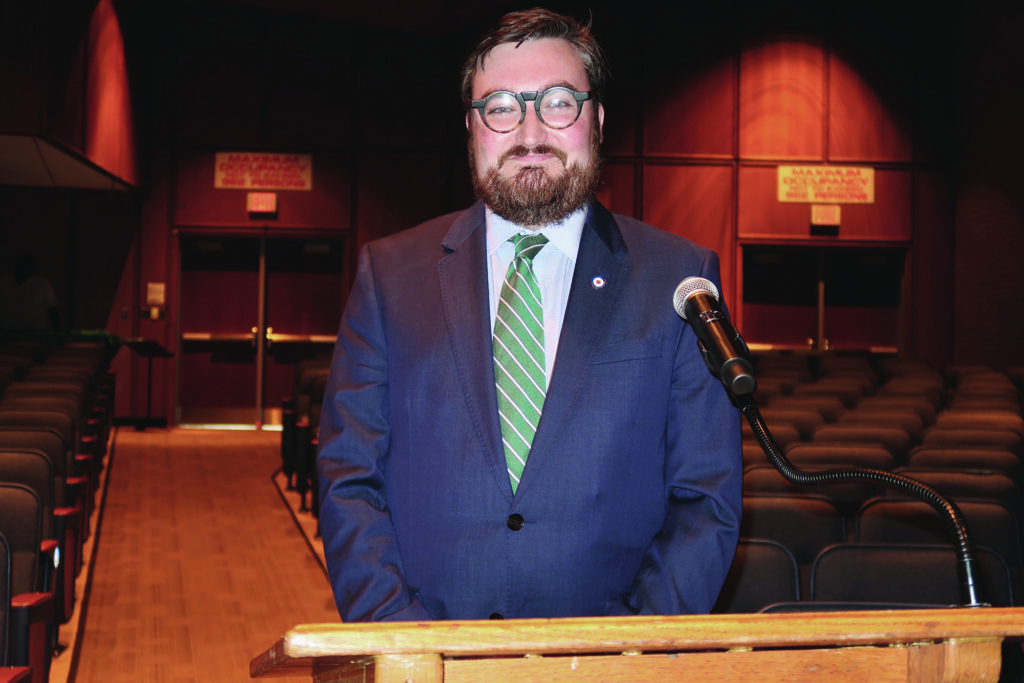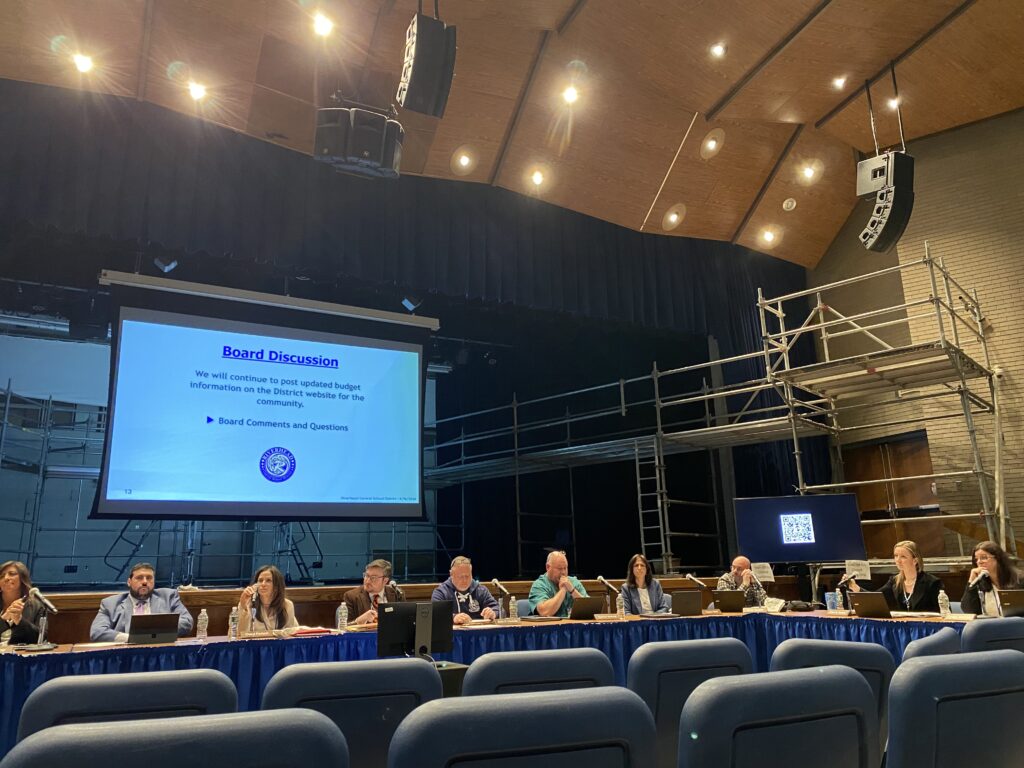Riverhead school board discusses austerity plans as governor gives go-ahead to fall reopening

Varsity sports or security guards? Language and literacy programs or after-school buses?
In the face of a failed budget, the Riverhead Board of Education is now tasked with making these concessions as they look to shave $2.3 million from the spending plan.
Board members met via Zoom Thursday night to discuss cuts that need to be made in order to operate within the $144.8 million contingency budget.
“There’s nothing here that’s easy,” said interim superintendent Christine Tona as she presented a list of recommended budget cuts. “Every item listed here is here for a reason, because that helps our school district operate efficiently.”
As expected, Gov. Andrew Cuomo said Friday that schools can reopen in the fall. All students will be required to wear masks when social distancing is not possible.
“Every student should plan to have one with them at all times,” the governor tweeted. “If a student does not have a mask, the school will be required to provide one.”
Districts are required to hold three to five public meetings with parents to discuss the plan prior to Aug. 21, the governor said. Another meeting must also be scheduled for teachers.
In accordance with state education law, contingency budgets do not allow for equipment purchases or raises for individually contracted staff — most members of the district’s central administration — resulting in a savings of $280,775.
Other recommended cuts under the plan released Thursday call for cuts to after-school buses at 3:15 and 4 p.m., junior varsity and middle school sports, art and technology courses at the high school, a science and library teacher at Pulaski as well as eliminating an auto mechanic, custodial, two clerical and computer technology support positions.
Additional cuts to the 5 p.m. bus, clubs and music and varsity sports would net $817,320.
While music lessons would continue during the school day, after-school activities and evening concerts would not be funded in the contingency plan. Ms. Tona also said that funding was preserved for the high school yearbook club, National Honor Society and student government in order to preserve certain experiences and traditions for juniors and seniors.
“We really hope that by the time springtime comes these students are able to enjoy their senior activities and their prom. It’s been heartbreaking for the seniors that just graduated not having those opportunities,” Ms. Tona said.
A list of further cuts that could be considered include eliminating three elementary sections at Phillips, Aquebogue and Riley Avenue elementary schools, business offerings at the high school, a literacy coach at Roanoke Avenue Elementary, math and reading Academic Intervention Service programs at the elementary level, the second security guards placed at each elementary school, college and AP-level foreign language courses, music lessons at Pulaski Street Elementary and teaching assistants in kindergarten classrooms.
Tensions sometimes flared during the meeting as board members began negotiating what changes will be made to the budget. The general consensus, however, is to try and preserve sports at the varsity level as well as clubs and music performance at the high school.
“We’re all struggling with this,” said board president Laurie Downs. “It’s our goal to try and keep [sports and music] somehow, some way. But it’s so hard. What do you take away? I’m sick over this.”
Board member Virginia Healy asked if it would be feasible to cut any costs from the charter school, which is currently slated to receive approximately $8.8 million.
Deputy superintendent Sam Schneider estimated that up to $250,000 could be moved from the charter school line comfortably.
“Anything more than that, I’d be nervous about additional charter school enrollment that could put us in a budget deficit,” he said, adding that he’d explore that option further.
Vice president Therese Zuhoski inquired about cuts to director salaries and positions over student programming — a move Ms. Tona said could put a strain on state-mandated reporting mechanisms including teacher observations.
But board member Chris Dorr said those duties could be undertaken by other administrators like building principals.
“I would rather make it inconvenient for a building principal … than make it inconvenient for one of our students that are counting on music requirements or a Blue Masques performance or athletic performance,” he said.
Mr. Dorr also asked for more specific data on how many students are enrolling in advanced level foreign language courses.
“If there’s only a handful of students … that’s a big chunk of change,” he said, taking note of the $116,648 cost listed in Thursday’s presentation.
Reducing the number of security guards at K-4 buildings from two to one would save approximately $161,618.
“I know it’s not a popular decision,” Mr. Dorr said, but may be justified since less students overall will be in the buildings at any given time.
But board member Brian Connelly disagreed with the idea.
“We’re going into the unknown,” he said, arguing that the guards may be needed in a year where building protocols will fundamentally change amid the coronavirus pandemic.
While he agrees that sports are also worth funding, Mr. Connelly pointed to current professional sports seasons underway and a recent COVID-19 outbreak among MLB teams.
“They’re in a bubble and still had an outbreak,” he said. “We can’t put our kids in a bubble.”
Beyond extracurriculars, Mr. Connelly said cuts to AIS programs could lead to students falling further behind.
Board member Susan Koukounas also took note of the current challenges posed by COVID-19 and how that will impact budgetary decisions.
“In reality, in the time we’re in, I don’t see any live performances happening in terms of art or music,” she said. “Even with athletics, with competitions, district to district.”
She suggested the board explore the cost associated with running athletics in a club setting as opposed to competing.
“I’m just trying to think out of the box,” she said.
Unspent money from the 2019-2020 school year is expected to move into reserve funds to offset an anticipated 20% reduction in state aid due to the COVID-19 economic impact.
In addition to making cuts, Mr. Schneider said the board may pursue the option of tapping into the Unappropriated Fund Balance, which is no greater than 4% of the budget and can be used toward unanticipated or unfunded expenses during the year.
“[It] is not—I want to emphasize—not a good long-term financial plan but in a one-year emergency situation, that’s why it’s there,” he said.
Since the July 28 revote failed by 59 votes, board members have received an outpouring of support for saving programs. Andrew MacGray, a Riverhead sophomore who organized a rally in support of the budget, posted a video to YouTube to garner support for clubs, sports and music.
The video, entitled “This is Why We Play” features photos and video of student activities set to a score of student performances.
In a statement to the Board of Education Thursday, Riverhead Central Faculty Association president Greg Wallace described the budget failure as a ‘demoralizing defeat.’
“The thought of empty fields, silent stages and loss of vital enrichment as well as academic programs for students weighs heavily on the parents of this community,” Mr. Wallace said.
But after Thursday’s discussion, Mr. Wallace described the list of alternate cuts being considered in order to save after-school activities as reckless.
“The Board of Ed told the community that if the budget didn’t pass, we would lose sports,” he said Friday. “Now it’s clear they used sports as a threat,” Mr. Wallace continued, adding that the fate of these activities are all uncertain due to the pandemic.
Cuts to elementary-level academic programs, Mr. Wallace said, would be devastating to young students. “Not every child plays sports,” he said. “But every child needs to learn how to read.”
The board plans to meet again Tuesday, Aug. 11 to begin finalizing these decisions.








